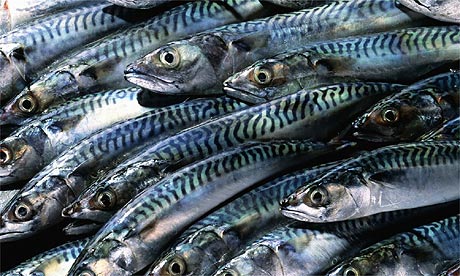One-third of fish caught in Channel have plastic contamination, study shows
Fish were found to contain small pieces of plastic known as 'microbeads', in a study of 10 species

More than one-third of the fish examined were found to contain small pieces of plastic less than 1mm in size, known as 'microbeads'. Photograph: Corbis
One-third of fish caught off the south-west coast of England have traces of plastic contamination from sources including sanitary products and carrier bags, scientists have found.
The Plymouth University study, published in the journal Marine Pollution Bulletin, looked at the occurrence of plastic in 10 species of fish caught in the English Channel.
Of 504 fish examined, more than one-third were found to contain small pieces of plastic less than 1mm in size, referred to by scientists as "microbeads".
Prof Richard Thompson of Plymouth Universitysaid in a statement: "We have previously shown that on shorelines worldwide and on the seabed and in the water column around the UK, these tiny fragments of plastic are widespread. But this new reseach has shown that such fragments are also being ingested by fish. Laboratory studies on mussels have shown that some organisms can retain plastic after ingestion, hence microplastic debris could also accumulate in natural populations."
This, say the researchers, could carry serious physical consequences for fish, creating blockages in their digestive systems or giving them a false sense of being full.
The fish – including popular species such as whiting, horse mackerel, John Dory and red gurnard – were collected from costal waters 10km south-west of Plymouth, at a depth of around 55 metres. Between one to 15 pieces of plastic were found in those 184 fish found to have synthetic polymers found in their gastrointestinal tract.
A spectrometer was used to identify 351 items removed from the fish, the majority of which was rayon, a synthetic fibre used in clothing and sanitary products. Other plastics included those "from the breakdown of larger items such as bags and bottles' polyester".
After years of declining use, the number of single-use plastic bagshanded out to shoppers by UK supermarkets rose for the second year running in 2011. A total of 8bn "thin-gauge" bags were issued in the UK in 2011 – a 5.4% rise on the 7.6bn in 2010 – with every shopper now using an average of almost 11 a month.
Thompson went on: "There is no threat to human health as the plastic was found in the fish gut which we do not eat. But we don't need to have plastic debris in the sea. These materials are inherently very recyclable, but regrettably they've been at the heart of our throw-away culture for the last few decades. We need to recognise the value of plastics at the end of their lives and need help from industry and manufacturers to widen the potential for everyday products to be reusable and recyclable."
This month, Unilever announced it was removing microbeads from its products, such as facescrubs and soaps, after a campaign by marine conservationists.
No hay comentarios:
Publicar un comentario